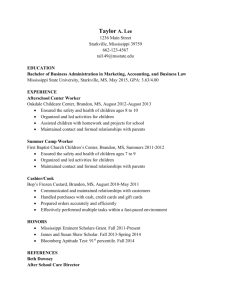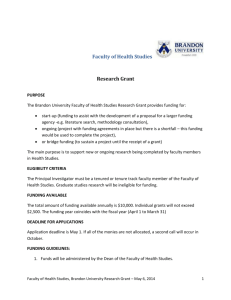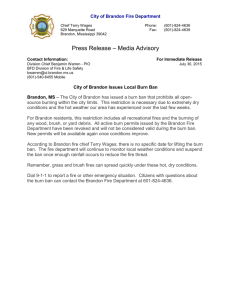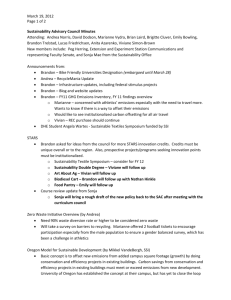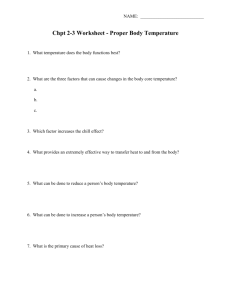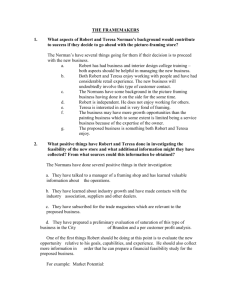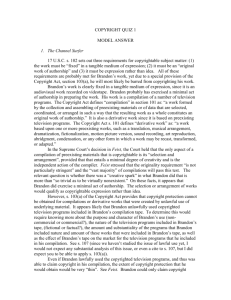Lauren Jones
advertisement
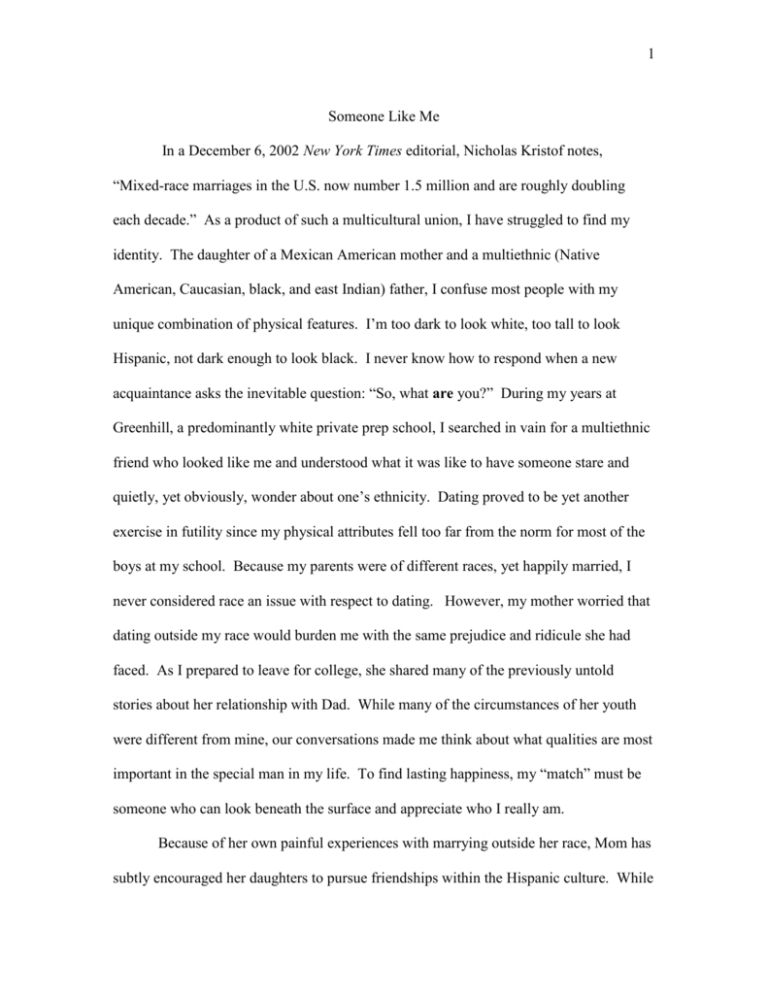
1 Someone Like Me In a December 6, 2002 New York Times editorial, Nicholas Kristof notes, “Mixed-race marriages in the U.S. now number 1.5 million and are roughly doubling each decade.” As a product of such a multicultural union, I have struggled to find my identity. The daughter of a Mexican American mother and a multiethnic (Native American, Caucasian, black, and east Indian) father, I confuse most people with my unique combination of physical features. I’m too dark to look white, too tall to look Hispanic, not dark enough to look black. I never know how to respond when a new acquaintance asks the inevitable question: “So, what are you?” During my years at Greenhill, a predominantly white private prep school, I searched in vain for a multiethnic friend who looked like me and understood what it was like to have someone stare and quietly, yet obviously, wonder about one’s ethnicity. Dating proved to be yet another exercise in futility since my physical attributes fell too far from the norm for most of the boys at my school. Because my parents were of different races, yet happily married, I never considered race an issue with respect to dating. However, my mother worried that dating outside my race would burden me with the same prejudice and ridicule she had faced. As I prepared to leave for college, she shared many of the previously untold stories about her relationship with Dad. While many of the circumstances of her youth were different from mine, our conversations made me think about what qualities are most important in the special man in my life. To find lasting happiness, my “match” must be someone who can look beneath the surface and appreciate who I really am. Because of her own painful experiences with marrying outside her race, Mom has subtly encouraged her daughters to pursue friendships within the Hispanic culture. While 2 it is certainly true that my life would be easier if I dated within my race, there is one unavoidable obstacle. As a person of so many cultures, how will I ever find a man of my same ethnic makeup? The closest compromise might be to marry a Mexican American man, since I am half Hispanic. However, my genes from my father’s side of the family make me tower over most Mexican men. More importantly, my pride in my multiethnicity prevents me from arbitrarily singling out Hispanic men, thereby ignoring the other parts of my heritage. For my mother, finding friends and dates within her ethnic group was hardly a challenge in Corpus Christi, Texas, a city where Hispanics remain the overwhelming majority. Her classmates, church friends, and neighbors were a homogeneous group of second-generation Mexican American teenagers just like her. Even when she left home to attend college at the University of Texas, she dated Hispanic men exclusively, ultimately becoming engaged to a Hispanic premed student, much to the delight of her family. However, while they appeared to be a perfect match on the surface, their personalities clashed. When she was accepted to medical school and her fiancée was not, the relationship quickly soured. Dad defied all her previous conceptions of the “ideal” man, yet he turned out to be her true match. Although they are not of the same ethnicity, they both have black hair and nearly identical complexions, a fact she hoped would somehow help appease her family. Unfortunately, this was far from the case. Finally finding love with a man of another race, she faced a barrage of questions from her family, friends, and even perfect strangers. How could she marry outside her culture? What would the children be like? Why was she defying her parents’ wishes? 3 In spite of intense family opposition, Mom quietly but defiantly followed her heart and married Dad. Although the marriage has been a happy one, her family’s disapproval drove a wedge between her and them that still exists today. When we go see our grandparents and cousins during major holidays, Mom always dreads the visits, keeping them as short as possible. While there is never any real confrontation or argument, the tension in the air is unmistakable. While Mom adamantly states she has no regrets about her choice to marry outside her race, she can’t bear the thought of her daughters enduring society’s disapproval if they follow her example. She often blames herself for my struggles in high school dealing with my multiethnic identity. While she tries her best to understand, she does not know how it feels to be of mixed heritage. My father, who attended school in Dallas during the 60’s, vividly recalls encounters with racism and prejudice, incidents so painful that he still cannot talk about his own multiethnicity, even with me. Thanks to the friends I made at MITE2S, a summer program at MIT for underrepresented minorities, and many soul-searching conversations with a biracial history teacher at my high school, I learned to embrace my differences and accept myself as I am. Still, my search to find someone like me continued, at least subconsciously, as I completed my senior year. I resigned myself to the fact that this would not happen until college. When I least expected it, I found my soulmate. In the spring of my senior year, I met Brandon, a ruggedly handsome black football superstar, who could not have been less appropriate as a match, or so I thought. At first glance, his jet-black complexion makes his facial features almost indistinguishable and often intimidates strangers, a valuable weapon on the field but an obstacle in making friends. Since he was only a 4 sophomore, I initially thought even a friendship was out of the question. Furthermore, he was a jock, destined for Division I football, while I was a geek, on my way to MIT. Although quite shy by nature, he found the courage to seek me out for casual conversations. Amazingly, we could talk for hours about how neither of us really felt like we fit into our “racial category,” I because of my mixed heritage and he because his skin was so much darker than that of other blacks. Gradually, his caring manner and infectious smile gradually wore down my resistance. When I casually mentioned my growing feelings for him to a mutual friend, she eagerly took on the role of matchmaker, even accompanying us on our first date. Over the rest of the school year, our friendship grew and eventually blossomed into romance. In a school of only four hundred students, there are no secrets, so we quickly became the talk of the school, much to our dismay. Our relationship has attracted more than its share of critics. Many of the black girls were unhappy that I had stolen one of the “good ones.” As one of my black girlfriends explained to me, black women don’t like to see black guys with girls of another race, because it makes them feel they are being rejected. Society already makes them feel ugly because the traditional definition of beauty is light skin, light eyes, and long blonde hair, virtually excluding them. Our friends also contributed their negative comments and unsolicited advice. Mine thought I had lost my mind to even speak to an underclassman, let alone date him. Several of my white friends took issue with his very dark complexion. Some would avoid talking to me altogether if I was with Brandon. They would ask if I would be alone for the evening before inviting me to dinner or a movie. Others whispered behind my back, wondering how I could be so “desperate.” Brandon’s black friends teased him 5 about being so dark, yet acting so white. When I tried to hang out with his friends, I would always get lost in the conversations because of their slang, which Brandon would try to duplicate. Understandably, we usually found it easier to be alone with each other. Then there were our families’ reactions. Although my parents were both initially shocked because of Brandon’s age and skin color, Mom could see how much we care for each other, so she quickly warmed up to him. For my father, it has taken much longer to break the ice. While he is still concerned about the obvious differences and the reactions of others, he has slowly come to appreciate Brandon’s respectful manner and strong values. My sister, while disapproving, keeps her opinions to herself for the most part, for which I am grateful. Brandon’s parents, although initially leery, have embraced me as one of their own, as have his brothers. They credit me for encouraging him to concentrate on his studies and not rely on football as his ticket to college. If Brandon is successful, he will be the first person in his family to graduate from college, a goal he and his parents hold above all others. While the differences between us are undeniable, there are many life experiences Brandon and I have in common. Both of us have dealt with the pain of not fitting into our social groups because of our color. Even at home, we have endured ridicule as the darkest members of our respective families. My sister is much fairer than I am, and my cousins, whose father is white, are as well. Try as she might, my maternal grandmother cannot hide her belief that lightness equates with beauty. Although Brandon’s parents are both black, they are several shades lighter than he is, a fact other family members inevitably mention. Together, we can joke about our color, making “light” of our darkness and reminding each other that real beauty is found within our souls. 6 We are also equally passionate about our career goals, albeit in very different disciplines. Brandon’s dream is to be a professional football player, a goal he knows is a long shot at best. However, he is determined to do everything he can to improve his chances. He trains religiously, even during the off-season. He participates in other sports to keep his physical condition at its peak. While friends experiment with controlled substances, he avoids alcohol, tobacco, and recreational drugs. His only weakness seems to be his addiction to Hostess chocolate cupcakes. Acknowledging that his dream may never come true, he is also committed to obtaining the best education possible. When he was offered the chance to attend Greenhill, over thirty miles from his home, he did not hesitate, even though it meant long commutes, demanding workloads, and financial sacrifice. Most of the students are much more affluent and have parents with more education, so fitting in socially is challenging. He was an honor student at his neighborhood school, but at Greenhill he finds his preparation woefully inadequate at times, yet he perseveres. When I think about the many sacrifices he has made to attend Greenhill, a privilege I often took for granted, I am truly inspired. As for my goal to graduate from MIT and become a physician, Brandon is my most ardent fan and supporter. When we first stated dating, I had already made the decision to attend MIT. As our relationship grew, I dreaded leaving him, yet he always encouraged me to follow my dream. My voluntary participation in Project Interphase meant I had to leave home much earlier than I had originally planned, but Brandon knew it would prepare me for my freshman year. Each time I felt homesick or lonely, he lifted my spirits. He added hours to his summer work schedule to save enough money to visit 7 me in Boston. His steadfast belief in me strengthens my resolve when fatigue overwhelms me. Most importantly, it makes me believe in myself. With respect to having children with Brandon or someone else of another race, I don’t worry about how my kids will be affected because I know they will be beautiful. Not that I will be able to shield them from the idle curiosity of those too ignorant to appreciate them as they are. However, I will teach them that there is no shame in being mixed, even if there are people who will try to make them feel otherwise. Instead of relying on the opinions of others, they will learn to look within for the qualities that build self-esteem—honor, integrity, and commitment. Thankfully, these qualities are colorless. Although the road has been bumpy at times, I prefer to think of my multicultural heritage as more of a blessing than a curse. Being of mixed ethnicity prevents others from trying to pigeonhole me into the stereotypes of a single race. Furthermore, being different builds character. I have learned to cherish the differences that make me unique, regardless of what some may think. I may not have as many friends as I would if I was of one race, but those that I do have accept me unconditionally. Like Kristof, I find hope in “the blurring of racial distinctions” and view interracial relationships as “one of the most positive fronts in American race relations today, building bridges and empathy.” There is still much work to be done, so for now I must cling to my personal values and reject the opinion of those who are too ignorant to appreciate me for my character instead of my color. For the special man who chooses to be like me, I promise one thing: together, we will overcome. 8

